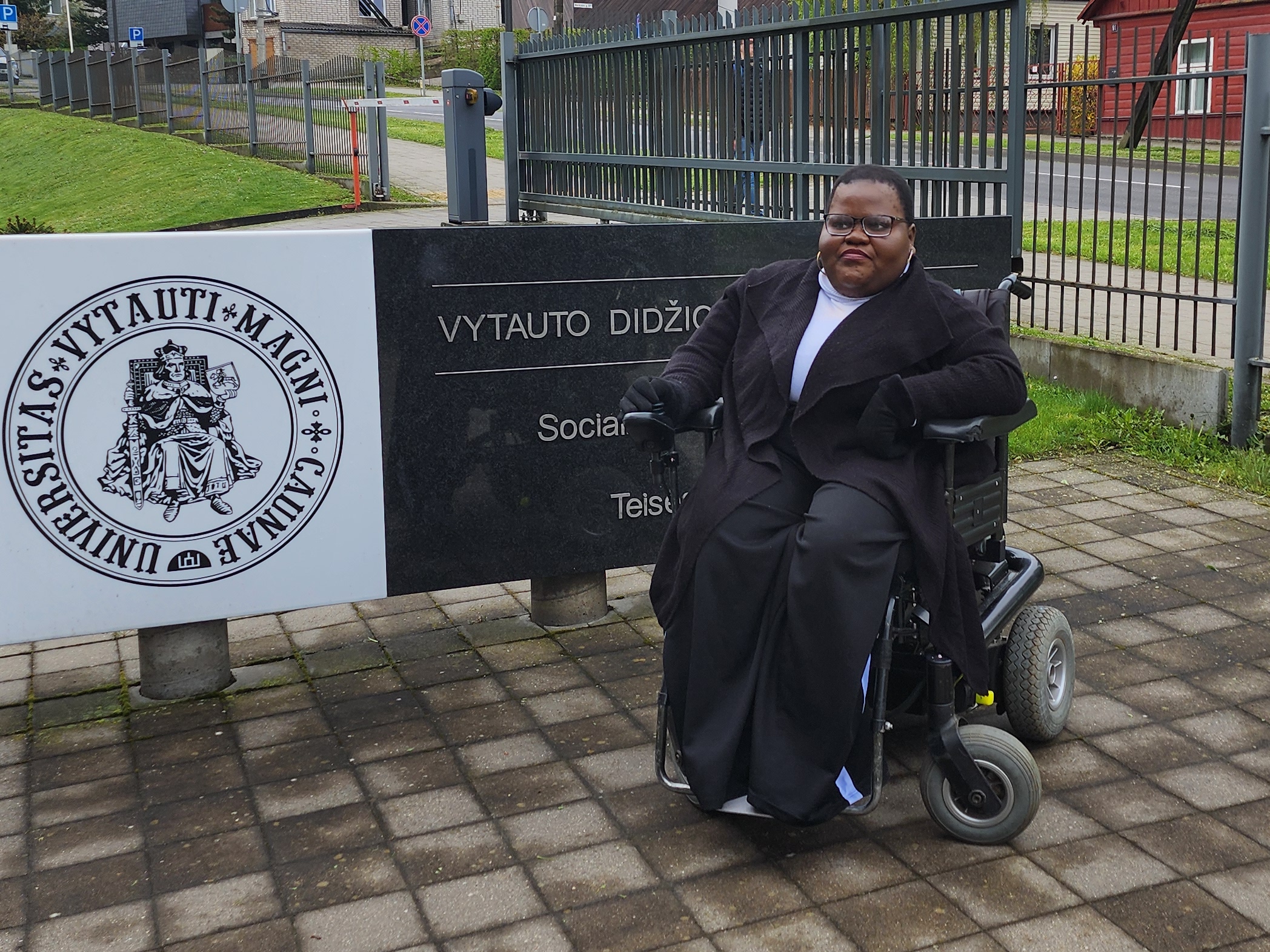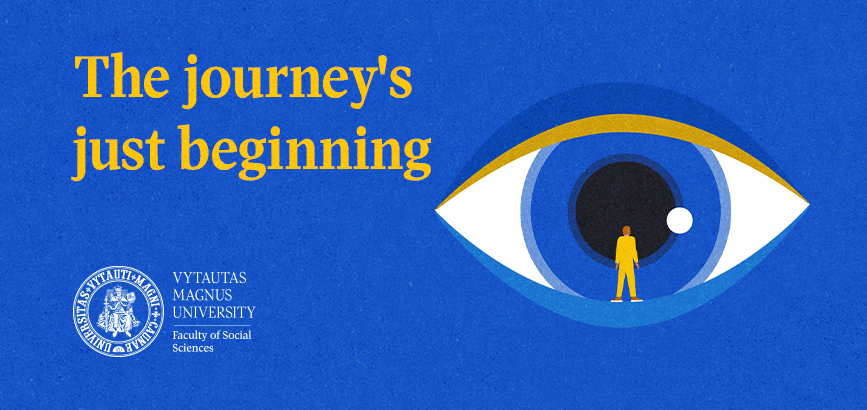PhD Student Princess Thembisile Sibanda: VMU Has Made Commendable Efforts to Support Students with Diverse Needs

“Lithuania has a unique blend of history, culture, and modernity. This country’s culture was fascinating to experience. The people I met were kind and welcoming, though cultural interactions sometimes felt more reserved compared to the social dynamics I’m used to in South Africa”, says Princess Thembisile Sibanda, PhD student from the University of Pretoria (South Africa) who visited Vytautas Magnus University (VMU) as a participant of the Erasmus exchange program during her master’s degree studies.
The doctoral student, who has a physical disability, is very proactive: she is not only preparing her dissertation in the field of psychology but also works as a radio presenter and takes part in various social initiatives dedicated to the promotion of diversity and inclusion. Sibanda explains that she chose Lithuania and VMU for her visit because of its strong academic culture, international outlook and the opportunity to experience a different research environment; additionally, she was curious about Lithuania’s cultural heritage and cuisine.
“I visited Vilnius, Trakai, and Kaunas. The highlight of my travels was Trakai Island; it was breathtaking! I got to be on a boat for the first time, which was an incredible experience. The views from Gediminas’ Castle in Vilnius were also spectacular, offering a panoramic look at the city’s historical beauty. I was excited to try Lithuanian cuisine, especially the infamous pink soup (šaltibarščiai). It was a unique experience! Lithuanian food was very different from what I’m used to”, the PhD student reveals.
Inclusive and International University
As a student with a disability, Princess Thembisile Sibanda expressed appreciation of VMU’s work in ensuring that studies and research are accessible to all students. VMU is the first higher education institution in Lithuania that started focusing on social inclusion of persons with disabilities through higher education. Today, the university is prioritising adaptation of studies in accordance with individual needs: not just physical or other disabilities but also psychological and emotional wellbeing, helping the students plan their studies and deal with personal efficiency, motivation, and other matters. Students are provided assistance in various areas by mentors and the Student Well-Being Coordinator. VMU has declared 2025 to be The Year of Student Well-Being and has launched a new mentoring program, “Peer-to-Peer”.
“VMU has made commendable efforts to support students with diverse needs. The university staff were helpful and accommodating, I appreciated the willingness of faculty and staff to assist wherever possible. Further investment in accessibility infrastructure would enhance inclusivity even more”, Sibanda notes.

Princess Thembisile Sibanda
In the PhD student’s words, VMU gave her a warm welcome and provided a supportive environment for independent research. She particularly liked the high degree of autonomy she was granted here, while at the same time receiving valuable guidance. Princess Thembisile Sibanda is especially thankful to the Head of Dept. of Psychology at VMU Faculty of Social Sciences, Assoc. Prof. Gabija Jarašiūnaitė-Fedosejeva.
“Compared to South African universities, I found the research environment at VMU to be more flexible. Another key difference is the internationalisation at VMU. The university has a strong global outlook and fosters engagement between students from diverse backgrounds”, she points out, adding that even though South African universities also have international partnerships, she was fond of VMU’s uniquely immersive atmosphere in a smaller academic community.
Discussions on Liberal Arts Left a Deep Impression
While visiting Lithuania in 2024, Princess Thembisile Sibanda was still an MA student working on her final master’s research work (dissertation), which is a requirement for Academic Masters in Psychology at the University of Pretoria. It focused on the lived experiences of sexually diverse Black South African people with disabilities. She chose this topic because it focused on a critically under-represented and marginalised group whose voices have often been excluded from both academic discourse and mainstream social narratives.
“In South Africa, despite having progressive legal frameworks supporting LGBTQ+ rights and disability inclusion, individuals at the intersection of these identities—particularly Black South Africans—have continued to face layered discrimination, social invisibility, and structural exclusion. By exploring their lived experiences through a qualitative lens, my aim was to highlight their daily challenges while contributing to the growing body of intersectional research and to advocate for more inclusive, empathetic social, policy, and institutional responses”, she explains.
This year, as a PhD candidate, Princess Thembisile Sibanda is working on her doctoral dissertation, whose topic was directly inspired by her visit at VMU, particularly the international academic forum The Idea of University which was dedicated to the 35th reestablishment anniversary of VMU. At the forum, various experts from all over the world discussed the transformations of the concept of university as well as the significance of the liberal arts (artes liberales) principles on which the VMU study system is based.
“It was during this engaging event that my research interest was ignited, as the discussions on curriculum transformation, interdisciplinarity, and the future of liberal education in a rapidly evolving world resonated deeply with my academic and personal aspirations”, reveals Sibanda.
Her PhD dissertation explores how the psychology curricula of South African universities integrate psychological knowledge and liberal education principles to prepare graduates for Society 5.0. The latter concept, created by the Japanese government in 2016, describes a new type of society which integrates advanced technologies such as AI across various sectors and areas of everyday life.

Princess Thembisile Sibanda
Work in Radio is Inspiring and Meaningful
The doctoral student also works as a presenter at Skills Village Radio, which devotes special attention to the rights, inclusion, and awareness of persons with disabilities. In her show, Sibanda not only investigates various issues related to these topics but also interviews disability advocates, mental health professionals, or people with lived experience. According to her, this is a meaningful and fulfilling job that also requires creativity, e.g. when writing scripts, curating music or audio segments, and promoting the show on social media.
“What’s truly enjoyable about this work is the opportunity to give a voice to under-represented communities, spark important conversations, and educate the public. It’s empowering to know the show can make someone feel seen, heard, and informed”, she says, admitting that it is not easy to balance this job with her PhD studies. However, the two roles do complement one another well: radio provides a break from academic intensity, and the PhD provides depth and insight into radio topics.
Princess Thembisile Sibanda is delighted by the opportunities provided by the Erasmus exchange program, which allows students to travel and get acquainted with foreign universities and cultures. The South African researcher, who spent three and a half months in Lithuania under Erasmus, confesses that she finds Lithuania to be an attractive country for life and work, especially in the academic field. Sibanda particularly enjoyed the country’s research environment, international collaborations, and the opportunities for growth in higher education.
Sharing her advice with students who are considering participation in Erasmus, Sibanda says that, first of all, it’s important to plan everything as early as possible, to find out all the requirements, and to engage with the university staff on all concerning matters. She also encourages students to try out new things, immerse themselves in a new culture and discover the local customs.
„Be open to independence: exchange programs, especially research-based ones, require self-discipline and proactive engagement. On the other hand, do network with students and academics – building connections can open doors for future collaborations and career opportunities”, she says, reminding everyone, especially the students with accessibility requirements, to advocate for their needs and communicate them early.












